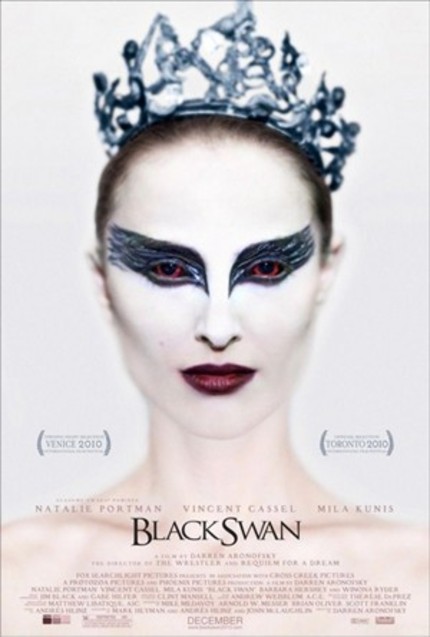TIFF 2010: BLACK SWAN Review

"I kill myself for you people every
night!" so the unspoken cry of the stage actor, or in this case the
professional Ballerina, goes. Darren Aronofsky continues his examination of the psyches of performers started with The Wrestler, but comes at things from the
opposite direction, age- and experience-wise. Black Swan charts the anxieties and temptations of a young ballerina, Nina
(Natalie Portman,) as she gets her shot at the big-time in a
production of Swan Lake. Nina has just been picked by legendary
Ballet director Thomas Leroy (Vincent Cassel, subdued and restrained)
to replace his aging muse (Winona Ryder) and take the central dual
role of the Swan Queen in his 'visceral and real' production of the
most famous (or overdone) of ballet. Nina is young enough that she
is still living at home with her mother, amongst her pink stuffies
and white laced bedspreads. She is a perfectionist, but not yet an
artist, naïve and a career surrogate for her mother who only made it
so far in the dance world in her day before having children. It is
nice to see Barbara Hershey in this film, but I wish she had a little
more to do. That applies to pretty much the entire cast with the
exception of Portman. Aronofsky keeps the camera on her face when
things are happening to her, but also favours that 'behind the head'
technique used frequently in The Wrestler. Something about that
technique that takes some of the visceral out of the picture. It
worked for the sad optimism of Randy The Ram, for the acute
performance anxiety and burbling internal pressures of Nina, the more
aggressive techniques he used in pi and Requiem for a dream may have
better served things. As it stands, there is something about Black
Swan that feels muted. For the high melodrama of the story and the
cliché feel of many of the scenes, not the least of which that
'there is always someone younger and hungrier to replace the lead,'
'it's lonely at the top,' etc a little more bombast may have helped
things along. This certainly is not a character study as the characters are all in total subservience to the metamorphosis angle of the story.
Still if one of the key advantages of cinema is to let the viewer experience a world they are unfamiliar with from the inside, and Black Swan does let you creep around inside of Nina's world, where reality is getting a little wobbly. Is that rash the beginning of her turning into an actual Swan? Brought about by the stress? I can only imagine the dedication that is required of people at the top of their field, be it sport or performing arts. Thomas, who is seen casually tossing aside his old star in favour of the new one, also seems to aim for high art using pretty extreme methods, albeit it is from the perspective of who those methods are practiced on. He initially tells Nina that she did not get the part, just to see how she reacts to failure. He tells her to touch herself more to find her passion. He seduces her if only to show that she failed to seduce him. The acts of professional cruelty are enough to suggest that he may be playing at pushing another dancer, Lily (Mila Kunis) into the lead role if only to force Nina to hit her darker headspace and channel that into the Black Swan. The requirement to for Nina to move from craft perfection to actual art. Besides, in a movie such as this, which is more sexy, the bad girl, Lily (you can tell because she has the black winged back tattoo and she smokes), behaving badly with sex and drugs pre-performance all-nighters, or the seduced innocent willingly partaking of narcotics and lesbian sex as an act of defiance?
Black Swan does play a little too cute
with its clues and symbols and does not go far enough to hit the
visceral visual highs of his previous pictures. Not to harp on this further, but it is not trashy enough to be Paul Verhoeven or grotesque enough to be David Cronenberg. Here Aronofsky has made a film for a much broader audience, and the film perhaps suffers a tad for it. It is a picture made for those people who vote for the Oscars or talk about the Oscars incessantly (Yes, I am not unaware of the irony in that statement, but when online and print
writers decry Natalie Portman is a shoe-in is it because this is the
best performance of the year, or is it because it is the type of
performance that wins Oscars? Does it really matter? For the record, I thought
Portman was ickier and stickier in Mike Nichols Closer. But where
the film does flirt with transcendence is when Nina finally
dances the Black Swan in front of an audience outside of the many on screen rehearsals. That is the shock and
awe I came for even if the picture on the whole suffers too often from the same meticulous craft-but-not-art Thomas is trying to beat out of Nina.







